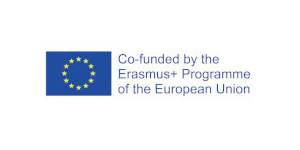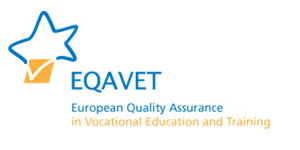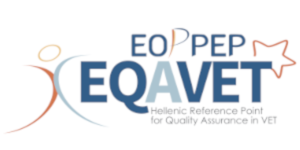"Peer Review as a tool for quality assurance"

This study visit report was prepared by Mrs Concetta Fonzo as the result of the study visit on “Peer Review as a tool for quality assurance”, organized 10-11 May 2018, which focused on the peer review methodology adopted by the NRP for Eqavet in Italy. All the participants expressed their gratitude to the representatives of the Italian Eqavet NRP for providing valuable methodological information and for their kind support during the whole study visit. The main purpose of the study visit was to provide an overview of the way peer review methodology, practices and tools are organized in Italy. It is expected that peer review methodology will play an increasingly important role in the Italian VET system as well as in other educational and training sectors.
Participants:
Carmen Gheorghița Musat, National Center For Tvet Development, Romania
Ioana Felicia Sandalescu, National Centre For Tvet Development, Romania
Mihaela Stefanescu, National Centre For Tvet Development, Romania
Angeliki Athanasouli, E.O.P.P.E.P, Greece
Aikaterini Alimperti, E.O.P.P.E.P, Greece
Keith Brumfit, Eqavet, UK
Leena Koski, Finnish National Agency For Education, Finland
Pietro Tagliatesta, Ministry of Labour, Italy
Angela Grieco, Ministry of Labour, Italy
Maria Antonietta Salvucci, Ministry of Education, Italy
Valentina Curzi, Anpal, Italy
Ismene Tramontano, Inapp, Italy
Claudio Vitali, Inapp, Italy
Concetta Fonzo, Inapp, Italy
Marianna Forleo, Inapp, Italy
Francesca Dipaolantonio, Ciofs-FP, Italy
Sylvia Liuti, FormAzione, Italy
This study visit report was prepared by Mrs Concetta Fonzo as the result of the study visit on “Peer Review as a tool for quality assurance”, organized 10-11 May 2018, which focused on the peer review methodology adopted by the NRP for Eqavet in Italy. All the participants expressed their gratitude to the representatives of the Italian Eqavet NRP for providing valuable methodological information and for their kind support during the whole study visit. The main purpose of the study visit was to provide an overview of the way peer review methodology, practices and tools are organized in Italy. It is expected that peer review methodology will play an increasingly important role in the Italian VET system as well as in other educational and training sectors.
Accordingly, more focus will have to be put on the methodology proposed within the Eqavet Network and other optimization procedures that will be necessary to adapt peer review in diverse sectors and areas at different levels: national, regional and local. The experience from Italy should serve as inspiration for this. Furthermore, other quality assurance issues were discussed during the study visit in Rome.
On the first day of the study visit, Mrs Ismene Tramontano of Inapp, coordinator of NRP for Eqavet in Italy, welcomed the group and presented Inapp as hosting institution of the Italian Eqavet NRP and organizer of the European study visit: “Peer Review as a tool for quality assurance”. She introduced also the two days agenda of the study visit and asked all the participants for a “tour de table”.
The first presentation of the study visit was held by Ms Angela Grieco, Ministry of Labour and Social Policies. She introduced the role of the Ministry of Labour, its general competences and those in the VET field, within the General Directorate of Unemployment and social benefits. Afterwards, she presented the historical background of the NRP, the role of Board of the Reference Point and the National Plan of Quality as well as its implementation phases.
While, Mr Pietro Tagliatesta, Ministry of Labour and Social Policies, introduced the last news at legal and system level with regards to the Italian Vocational and Educational System and related issues.
The second presentation was carried out by Mrs Maria Antonietta Salvucci, Ministry of Education, University and Research, with focus on the Italian Education System. She introduced the whole Italian system starting from pre-primary till to higher education with special attention to second cycle of secondary teaching and higher education. It was stressed also how the Italian situation is characterized, at national and regional level, by multiple institutional actors that contribute in different ways to the implementation of the Quality Assurance System. Regarding the National Plan, it was said that it is an institutional framework which brings together several existing measures for quality assurance, making them coherent as well as guaranteeing consistent choices and tools. The legislative national references of the Plan are both the "Buona Scuola" (Law N. 107/2015) and the Jobs Act. And, starting from mapping the current situation, the National Plan aims at reducing and preventing training failure and early school leaving through the continuous improvement of the training supply as well as the promotion of a quality culture of systems and procedures.
The initiatives endorsed by the Ministry of Education come within the National Evaluation System (Presidential Decree No. 80 of the 28th of March, 2013), based mainly on self-assessment, external evaluation and social diffusion of evaluation results and whose main actors are INVALSI (National Institute for Evaluation of Education and Training System), as coordinator, INDIRE (National Institute for Documentation, Innovation and Educational Research) and a team of inspectors. The adoption of different tools and instruments is provided, by using at the same time qualitative and quantitative assessment, in order to manage the complexity of the system and its different levels.
The third presentation on “The Active Labour Market Policies (ALMPs) in the national context and in connection with the European scenario” was held by Mrs Valentina Curzi, Anpal. She presented the Italian labour market reform with the Jobs Act (2014) and its implications for the Italy with the creation of Active Labour Market Policies (ALMPs) legal framework and the National Network of services for employment policies. She also introduced Anpal, the National Agency for active labour policies, its main functions, services, measures, organization in a multilevel governance. Training policies and EU transparency tools and systems were described, as well.
Later, Mrs Marianna Forleo, Inapp, illustrated the EQAVET-NRP-IT-2017 Project co-funded by the European Union’s Erasmus+ Programme. She described the Italian Reference Point Activity Plan 01.04.2017 – 31.03.2019 (restricted call for the QANRPs – EACEA 36/2016) co-financed by ANPAL. In particular, she focused on: the involvement of the Social Partners; the transnational study visits, the two transnational Peer Reviews; the training trainers’ research and other relevant national initiatives. Moreover, she talked about the activities carried out by the Eqavet working group on “The role of QA in Vet in the Eu policy context” in which the Italian NRP was involved, too. And, finally, she showed the new Eqavet web site and its content, available at the following link: www.inapp.org/eqavet.
Then, the talk of Mr Keith Brumfitt form the EQAVET Secretariat followed. He introduced the Eqavet in the European dimension and the European cooperation in VET. He told about the role of quality assurance in VET and provided information about monitoring activities realized on the use of EQAVET at the system and provider level in 2016, in both IVET and CVET. Regarding the past and future activities and events, he listed the following points:
- The importance of EQAVET+ which complements the EQAVET Recommendation;
- The development of the EQAVET Resources section of the website;
- The Annual Network Meeting in Sofia, in June 2018;
- The development of a strategic review of the EQAVET Recommendation;
- The 2018 PLA in Cyprus on the QA of higher level VET;
- The Annual Forum in November 2018.
And, finally, he displayed the European Eqavet web site (www.eqavet.eu) and its content.
Representatives from the invited countries: Greece, Romania and Finland were asked to make a presentation on their national contexts, NRPs and activities.
The Greek rapporteur introduced Eoppep as the authority body operating under the supervision of the Ministry of Education, Research and Religious Affairs. Eoppep certifies the vocational training of graduates of IVT institutes, the teaching competences of trainers of adults and the professional competences of professionals.
The Romanian speaker presented the “Quality assurance in education and training in Romania”. In Romania, GNAC – is a national QA coordination structure set up in 2006 – the Romanian Quality Assurance Reference Point (the National Group for Quality Assurance in Education and Training - GNAC), based on Inter-institutional Agreement between the: Ministry of Education, Ministry of Labour, Romanian Agency for Quality Assurance in Pre-university Education, National Authority for Qualifications, National Centre for TVET Development and social partners. In the above framework, the integrated activities to ensure for QA in VET include: Self-assessment, School monitoring / Inspection, External evaluation and Partner networks. While the future actions for Romania will include:
- Developing a mechanism to evaluate and monitor the quality assurance of work-based learning ( WBL);
- Developing a mechanism for systematic monitoring, evaluation and review of the quality of vocational training at VET system level;
- Developing a mechanism for recognizing excellence in provision initial vocational training programs;
- Preparing 200 teachers to apply the quality assurance mechanism at work-based learning (WBL);
- Developing a quality barometer in VET.
The Finnish rapporteur held a presentation on “How to ensure the quality of VET, self-assessment and external evaluation in Finland”. From the beginning of 2017, the Finnish National Board of Education and Centre for International Mobility CIMO merged to form Finnish National Agency for Education (EDUFI). EDUFI is a national development agency working under the Ministry of Education and Culture and its tasks and organization are set in the legislation. Its core tasks are to develop education and training, early childhood education and lifelong learning and to promote internationalization in Finland. It hosted also the National Reference Point for Quality, with about 370 people. Currently, VET providers need to have a quality assurance system in place (Law, 1.1.2018) and they are responsible for the further development of the quality assurance system. Providers can choice the methods of quality management and self-assessment. There are also voluntary mechanisms (Quality Management Recommendation for VET, Quality awards for VET, Peer Reviews, etc.), National QA Network and QA Networks of VET providers; VET providers can use audits/external evaluation on their own initiative, too.
The morning session was closed by Mrs Concetta Fonzo, Inapp, with a presentation about: “How to ensure the quality through the Peer Review Methodology, the Italian experience”. She explained how the Peer Review methodology is included among the main tools of the National Plan for Quality Assurance of the Education and Training system in Italy. The educational and training providers indeed are fostered to introduce self-assessment and/or the Peer Review Methodology among their methods of assessment. After illustrating the two experimentation phases of the Peer Review methodology in Italy, she also listed the future challenges.
Finally, the usage of the Peers Register with the purpose of compiling a short-list of National experts was discussed with its quality perspective. The Italian National Peers Register is accessible at the following link: http://inapp.org/it/eqavet/Registro%20nazionale%20dei%20pari.
The afternoon session included two presentations, the first one held by Mrs Francesca Dipaolantonio, Ciofs-FP, who presented the activities and initiatives of Ciofs. The second presentation was held by Mr Claudio Vitali, as National Coordinator for the EU Agenda on Adult Learning, about the experimentation of the Peer Review Methodology in the Adult Education area and the promotion of it in particular within the Provincial Centers for Adult Learning (Centri Provinciali per l’Istruzione degli Adulti - CPIA).
The first day of activities ended with a study visit at the premises of the Italian Ministry of Labour in via Veneto where Mr Pietro Tagliatesta and Ms Angela Grieco illustrated the framework of quality assurance in education and training in Italy.
On the second day, Mrs Ismene Tramontano and Concetta Fonzo from Inapp started the study visit at the VET provider CIOFS-FP Lazio in Rome.
Mrs. Mary Cristina Lorenzoni, School Principle, welcomed all the participants and illustrated the historical background, the mission and vision, processing and dissemination procedures, main functions of the whole structure as well as modern development trends. Later, Mrs Francesca Dipaolantonio, Ciofs-FP presented the past Peer Reviews carried out within the CIOFS main activities and the added value of the implementation at local level of the Peer review methodology.
During the morning, all the participants at the study visit had the opportunity to visit the whole Institute, to access the training sessions and to interview the training staff to understand the real impact of Peer Review on the actual quality of their training offer.
In the afternoon, the study visit continued at Inapp with a final session of “questions and answers” where feedbacks from all the participants were collected. The final conclusions included the proposal for the future NRPs project to propose specific themes for each country based on their expertise, so for e.g. Italy could support the Peer Review Methodology while other countries work-based learning and so on. The study visit ended with a farewell by Inapp.
Main issues were discussed during the whole study visit
- National Vet Systems and QA at regional, national and European level;
- Structure and organization of NRPs for QA of Eqavet;
- NRPs activities and initiatives at national level;
- Eqavet tools and their adaptation and implementation at national level;
- Peer Review Methodology, the Italian experience
- Examples and best practices for implementation of Peer Review Methodology.
Results of the study visits
The study visit organized by the Italian NRP of Eqavet in Rome provided a chance to get introduced to the Italian experience in using and organizing methodological work in relation to the Peer Review methods. The attention was put to both work already done and future challenges. In addition, relevant discussions about the NRPs activities and initiatives related to the adaptation and implementation of Eqavet Recommendation at national level took place. The need to further invest in the experimentation of the use of the Eqavet indicators in different fields and areas was stressed. Moreover, it was important to share and exchange the experiences that at different levels were realized in relation to the Peer Review Methodologies. For the next future, the following points will be explored:
- the impact of the methodology at different levels: providers and system;
- the financial requirements and needs that the implementation of the methodology requires by both the providers and the final users.
 English (UK)
English (UK)  Greek (Greece)
Greek (Greece) 


